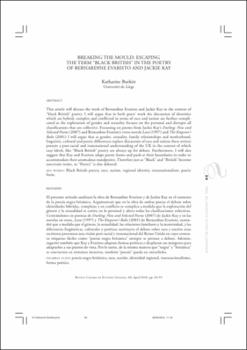Breaking the mould: escaping the term "Black British" in the poetry of Bernardine Evaristo and Jackie Kay
Autor
Burkitt, KatharineFecha
2010Resumen
This article will discuss the work of Bernardine Evaristo and Jackie Kay in the context of “black British” poetry. I will argue that in both poets’ work the discussion of identities which are hybrid, complex and conflicted in terms of race and nation are further complicated as the exploration of gender and sexuality focuses on the personal and disrupts all classifications that are collective. Focussing on poems from Jackie Kay’s Darling: New and Selected Poems (2007) and Bernardine Evaristo’s verse-novels Lara (1997) and The Emperor’s Babe (2001) I will argue that as gender, sexuality, family relationships and motherhood, linguistic, cultural and poetic differences replace discussion of race and nation these writers
present a post-racial and transnational understanding of the UK in the context of which easy labels, like “Black British” poetry are always up for debate. Furthermore, I will also suggest that Kay and Evaristo adapt poetic forms and push at their boundaries in order to accommodate their anomalous standpoints. Therefore just as “Black” and “British” become uncertain terms, so “Poetry” is also debated. El presente artículo analizará la obra de Bernardine Evaristo y de Jackie Kay en el contexto
de la poesía negra británica. Argumentaré que en la obra de ambas poetas el debate sobre
identidades híbridas, complejas y en conflicto se complica a medida que la exploración del
género y la sexualidad se centra en lo personal y altera todas las clasificaciones colectivas.
Centrándome en poemas de Darling: New and Selected Poems (2007) de Jackie Kay y en las
novelas en verso, Lara (1997) y The Emperor’s Babe (2001) de Bernardine Evaristo, sostendré que a medida que el género, la sexualidad, las relaciones familiares y la maternidad, y las
diferencias lingüísticas, culturales y poéticas sustituyen el debate sobre raza y nación estas
escritoras presentan una visión post-racial y transnacional del Reino Unido en cuyo contexto etiquetas fáciles como “poesía negra británica” siempre se prestan a debate. Además,
sugeriré también que Kay y Evaristo adaptan formas poéticas y desplazan sus márgenes para
adaptarlos a sus puntos de vista. Por lo tanto, de la misma manera que “negra” y “británica”
se convierten en términos inciertos, también “poesía” queda en entredicho.





